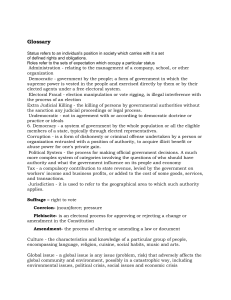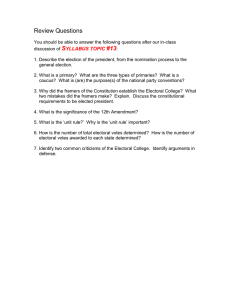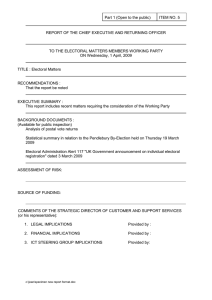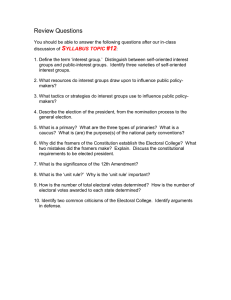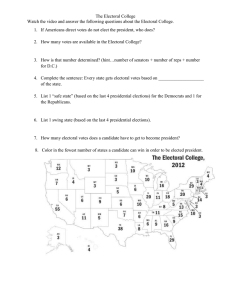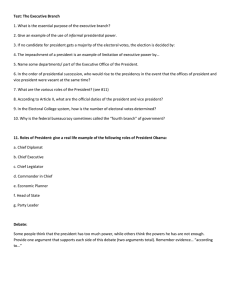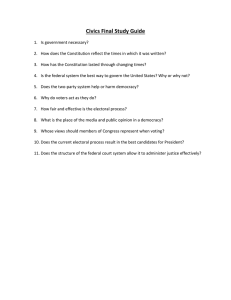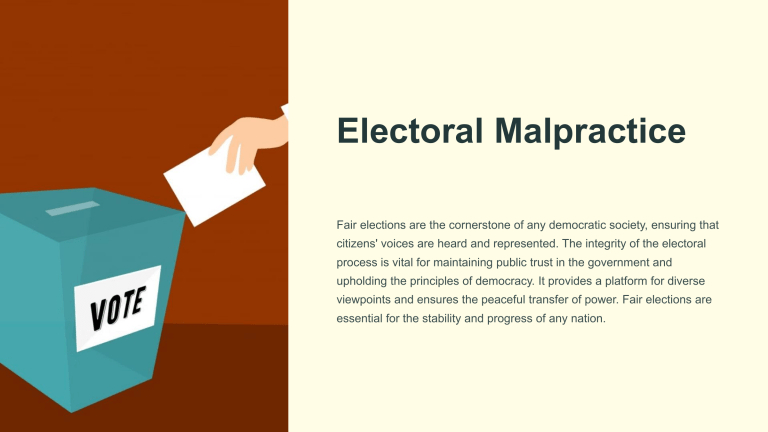
Electoral Malpractice Fair elections are the cornerstone of any democratic society, ensuring that citizens' voices are heard and represented. The integrity of the electoral process is vital for maintaining public trust in the government and upholding the principles of democracy. It provides a platform for diverse viewpoints and ensures the peaceful transfer of power. Fair elections are essential for the stability and progress of any nation. Agenda • Introduction to Electoral Systems • Significance of Fair Elections • Understanding Electoral Malpractice • Contemporary Issues and Case Studies • Strategies for Prevention and Reform • Role of Technology • Public Awareness Initiatives • Building Trust in Electoral Systems • Safeguarding Democratic Principles Understanding Electoral Malpractice Definition and Types Historical Context Electoral malpractice Throughout history, electoral encompasses a range of illicit malpractice has tainted the Creating public awareness activities that aim to democratic process. Notable about electoral malpractice is compromise the fairness of examples include the crucial in safeguarding the an election. This includes Tammany Hall corruption in integrity of elections. voter suppression, ballot 19th-century New York and Strategies such as stuffing, and various forms of the controversial 2000 US educational campaigns and fraud. Understanding the presidential election. These outreach initiatives play a key types of malpractice is incidents have influenced the role in empowering voters to essential for implementing development of modern recognize and report effective prevention electoral systems. malpractice. strategies. Public Awareness and Education Contemporary Issues and Case Studies 1 Recent Examples Recent cases of electoral malpractice globally have raised concerns about the erosion of democratic values. These instances have the potential to undermine public trust in the electoral process and weaken the foundations of democracy. 2 Global Perspectives Examining electoral malpractice from a global perspective reveals varying approaches to addressing these issues. Contrasting regional strategies provides valuable insights into potential solutions and preventive measures. 3 Case Study: Example Case An in-depth analysis of a specific electoral malpractice case sheds light on the complexities and challenges involved. By dissecting the case, lessons can be learned, and strategies for prevention can be formulated. Case Study: Voter Suppression in XYZ Election During the XYZ Election, there were widespread reports of voter suppression tactics being employed to deter certain groups of voters from casting their ballots. One of the most significant incidents occurred in District ABC, where polling stations were deliberately closed in predominantly minority neighborhoods, making it extremely difficult for residents to exercise their right to vote. This case of voter suppression raised concerns about the fairness and inclusivity of the electoral process, highlighting the need for robust measures to prevent such malpractices and protect the democratic rights of all citizens. Strategies for Prevention and Reform 1 Voter education and public awareness Educate voters about their rights, the importance of their vote, and how to identify and report malpractices. When people are aware of the importance of their vote and the impact it can have on governance, they are more likely to engage in voting and other civic activities. This increased participation strengthens democratic institutions and fosters a sense of civic responsibility among citizens. 2 Strengthening Legal Framework Electoral Law Reforms: The electoral laws should be reformed to give it teeth and bite. The laws should be stringent enough to deter offenders. Enforcing stringent laws against electoral malpractices, with severe penalties for offenders. 3 International Cooperation International collaboration and cooperation play a significant role in preventing electoral malpractice. Establish mechanisms for monitoring and observing elections by domestic and international observers, as well as by civil society organizations. Ensure that electoral procedures, including voter registration, ballot counting, and results transmission, are conducted openly and are accessible to the public. Role of Technology Transparency Data Analysis Technological solutions Data analytics and contribute to the algorithms assist in transparency of electoral identifying irregularities, processes, allowing for ensuring the accuracy and greater public scrutiny and integrity of election results. accountability. Advanced Detection Technology provides advanced tools for detecting and preventing electoral malpractice, enhancing the transparency and fairness of election processes. Public Awareness Initiatives Education Campaigns Community Engagement Media Partnerships Engaging in widespread Encouraging community Collaborating with media education campaigns to involvement in outlets to disseminate raise awareness about safeguarding the integrity information about electoral electoral malpractice is of elections strengthens the malpractice ensures critical for empowering collective responsibility of broader reach and voters to recognize and citizens in upholding increases public vigilance report irregularities. democratic values. against illicit activities. Building Trust in Electoral Systems 85% 2 Transparency Rating Citizen Participation Enhancing transparency in the electoral process Encouraging active citizen participation fosters a can significantly bolster public trust and sense of ownership and responsibility in confidence, leading to a more robust democratic safeguarding the integrity of elections. framework. Safeguarding Democratic Principles Educational Empowerment Global Collaboration Accountability Measures Empowering citizens Fostering international Implementing robust through education and collaboration and accountability measures access to information is knowledge sharing is a serves as a deterrent to fundamental in ensuring vital component in electoral malpractice and the preservation of upholding the democratic reinforces the integrity of democratic principles. foundations of elections the electoral process. worldwide. Conclusion After exploring various aspects of electoral systems and democratic processes, it is evident that fair and transparent elections are the foundation of any thriving democracy. By ensuring equal representation, protecting the integrity of the voting process, and promoting accountability, fair elections empower citizens and uphold democratic principles. Tables Country Electoral System Voter Turnout United States First-past-the-post 55% Germany Mixed-member proportional 75% India First-past-the-post 67% Topic Main Point Significance of Fair Elections Free and fair elections are essential for democracy and representation of the people. Understanding Electoral Malpractice Electoral malpractice can take many forms, such as voter suppression, ballot tampering, and campaign finance violations. Contemporary Issues and Case Studies Recent examples of electoral malpractice include gerrymandering, voter ID laws, and misinformation campaigns. Strategies for Prevention and Reform To prevent electoral malpractice, strategies such as transparency, accountability, and education are crucial. Role of Technology New technologies can be used to enhance the security and transparency of electoral systems, but also pose new challenges and Public Awareness Initiatives risks. Public awareness initiatives can help to inform citizens about the importance of fair and free elections, and encourage their participation in the electoral process. Building Trust in Electoral Systems Building trust in electoral systems requires a multi-faceted approach, including improvements in transparency, accountability, Thank You for Your Attention! We hope that this presentation has been informative and thoughtprovoking. By participating in this discussion, you have contributed to the ongoing dialogue about the importance of free and fair elections in democratic societies. We encourage you to continue learning and engaging with these issues, and to work towards building a more just and equitable world.
